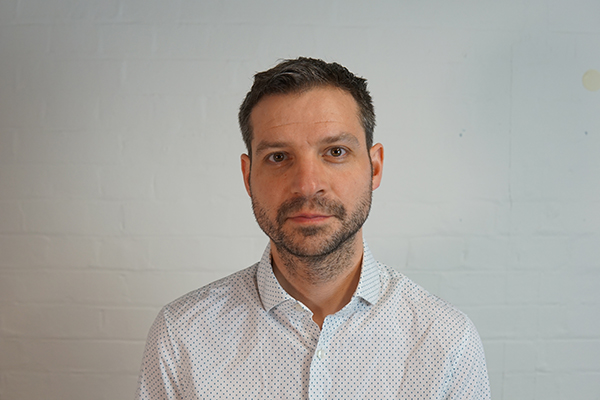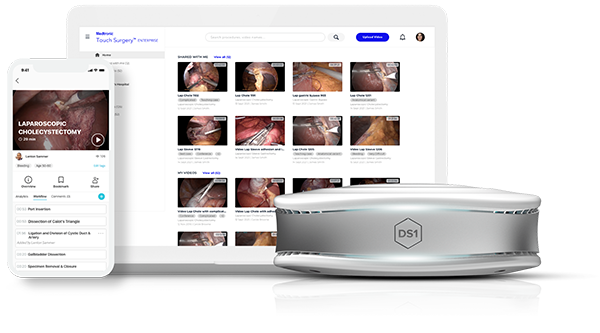How Medtronic is driving the digital transformation of surgery
Six questions with George Murgatroyd, vice president and general manager of Digital Surgery
Digital technology has changed our lives. So should surgery be any different? George Murgatroyd, vice president and general manager of Digital Surgery, believes the answer to that question is a resounding “No.” Murgatroyd is helping Medtronic lead the digital transformation of surgery by driving the connectivity of data, surgical robots, software, and healthcare technology. Murgatroyd gave the following interview as part of the MedtronicTalks podcast series. It has been condensed here and edited for clarity.

What is your background?
It’s been an interesting journey. I come from a family of physicians. One of my siblings is a psychiatrist, which can make family gatherings pretty interesting. I didn’t study medicine. I studied philosophy and was a drummer in a rock band. But it turns out, job boards aren’t awash with jobs for philosophers. And the rock thing kind of fizzled out.
Healthcare has always been a really big draw for me because of my family. I started working at the National Health Service (NHS) almost 20 years ago in primary care, which is the first time I came face to face with this paper-based system that really doesn’t have technology designed for physicians – and has limited data. And so for the past few years, I've really tried to continue to drive better data, better products for doctors, their teams, and healthcare systems. And it's been a really fun ride so far.
How did you find your way into the healthcare technology industry?
I worked at a leading health data science and software company that was acquired by a multibillion-dollar telecommunications group, that was diversifying into health. And then I was approached by the Touch Surgery team. At that time, it was a start-up trying to solve some of the key challenges in surgery. I remember my first interview. I turned up in a suit and the CTO (chief technology officer) was wearing shorts and a vest. The company was this amazing combination of technologists, AI engineers, surgeons, medical experts, all trying to drive some ambitious goals that convinced me to join and then we came to Medtronic in 2020. And now we're driving that connectivity of software, devices, robots, and data together into something really exciting.
What does the Touch Surgery app do?
We all know surgeons have to be really good with their hands, amazing athletes with their hands. But the founders of Touch Surgery were really focused on their cognitive ability, the ability of learning and bringing your brain to work. The founders saw real opportunities to utilize technology to aid the education and training of surgeons. So one of the first products they built was an app to host simulations to help inform and train surgeons in the steps of surgery. They firmly believed surgery was a science that followed a certain path, and by working with some VFX artists, software developers, and animators, they bought surgery to life, at the fingertips, on mobile phones. Now thousands and thousands of surgeons have utilized it to learn and rehearse surgery. And I think this created the opportunity to digitize surgery, to bring surgery online, and move operating rooms away from the textbook into this world of consumer apps.
Why do you think the app is so popular with users?
I think there was just a dearth of access to an immersive experience in terms of surgical training. Most of it has been paper-based. Touch Surgery really brought the end-to-end procedure to life in a highly visual, interactive way. Also, I think surgery can be quite isolating. There's obviously a community of surgeons but a lot of the work they do is in a room with only themselves and their team. And what I think what we did was bring surgery to life by working with surgeons around the work to define their procedures, and de-isolate surgery and bring it to their fingertips.
I think there’s also interest from the public as well. Everyone wants to understand how brain surgery is done, how surgeons cut into the skull, etc. So we do keep it open and free to the public to democratize really great learning on surgery.

Where does Touch Surgery Enterprise fit into Medtronic?
Put your memory goggles on and rewind 20 years and you think about what your home was like 20 years ago. You watched your TV via cable. You watched your movies through a DVD player, played your music by CD. You knew how much money you had in the bank because you got a paper statement. Now think about what's happening in our homes today. Software and technology are absolutely transforming our lives. If you think about the average operating room, in terms of software and assisting surgeons to making their lives easier, I think we're closer to 2002 than 2022. Surgeons still watch video through DVDs. They still use paper to order items. Their IT equipment is often over a decade old. Between 2002 and 2022, Medtronic has pioneered amazing technology, precision engineered instruments, robotics platforms, and driven an amazing step change in putting these tools into the hands of surgeons.
But what’s missing – the final piece of the pie – is this critical, digital element. Layering in this digitization of surgery can act as a force multiplier to devices, robotics, and medical know-how. We're really on the cusp of a digital transformation of surgery, with software and computing focused on improving the clinical experience. We were brought into Medtronic to do precisely this: layer in digital solutions. We joined the surgical robotics division, which I think was a very smart move to drive that force multiplier effect, purposefully incorporated into a robotic and surgical ecosystem.
What does the future of surgery look like in 20 years?
I think as we move forward, there will be increasingly robust information that's going to support surgeons as they train. And it's going to be really meaningful globally, to democratize the best surgical practices. And the data element I think is really exciting. There's an opportunity to connect a lot of the information from operating rooms across the patient or surgical pathway and provide a holistic but very nuanced, precise way of understanding patient care and surgery. I think a good analogy is smart cars. We have witnessed a revolution in cars becoming smarter, assisting drivers with things computers or sensors can predict. We're going to see the same within surgery – and I truly believe lives will be both saved and improved.
Hear more from George Murgatroyd on the MedtronicTalks Podcast.
